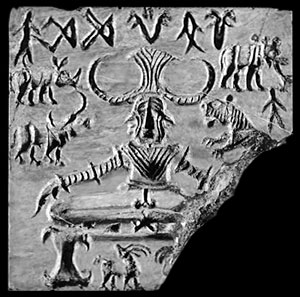Pasupati is the name of Shiva, who was the `Lord of cattle`. Pasupati is one of the eight Rudras, the one who has the place of fire.
The name Pasupati has also been deduced as lord of creatures more generally. The Rig veda has the related pashupa as protector of cattle.
On a seal discovered in the context of the Indus Valley Civilization Pasupati has also been applied to a figure, probably a deity, depicted as sitting surrounded by animals, Parallels have also been drawn with the Celtic Cernunnos.
The Pashupatinath Temple is the most important Hindu shrine for all Hindus in Nepal and also for many in India and rest of the world.
 A seal discovered during excavation of the Mohenjodaro archaeological site in the Indus Valley has drawn attention as a possible depiction of a `yogi` or `proto-Shiva` figure. Some spectator describes the figure as sitting in a traditional cross-legged yoga pose with its hands resting on its knees. Again this Pasupati sited figure is described as having three faces, seated in a `yoga posture` with the knees out and feet joined.
A seal discovered during excavation of the Mohenjodaro archaeological site in the Indus Valley has drawn attention as a possible depiction of a `yogi` or `proto-Shiva` figure. Some spectator describes the figure as sitting in a traditional cross-legged yoga pose with its hands resting on its knees. Again this Pasupati sited figure is described as having three faces, seated in a `yoga posture` with the knees out and feet joined.
Pasupati`s this posture is characterized as `speculative`, saying that while it is not clear from the seal that the figure has three faces, is seated in a yoga posture, or even that the shape is intended to represent a human figure, it is nevertheless possible that there are echoes of Shaiva iconographic themes, such as half-moon shapes resembling the horns of a bull.
This article is a stub. You can enrich by adding more information to it. Send your Write Up to content@indianetzone.com









